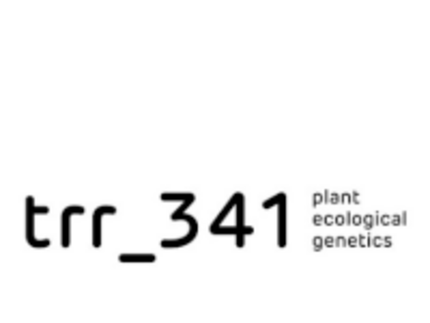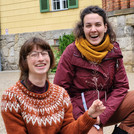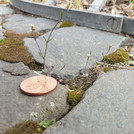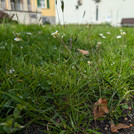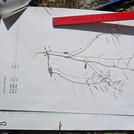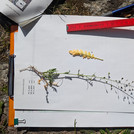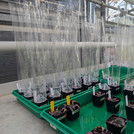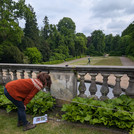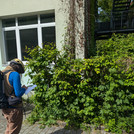Plant Ecological Genetics: Collaborative Research Center (TRR) 341
The CRC TRR341 "Plant Ecological Genetics" is a transregional collaborative research centre funded by the German Research Foundation. The CRC TRR341 works on identifying the genetic mechanisms of trait variation promoting plant adaptation to environmental changes.
Please have a look on the official project website for more details.
Mission
Ecosystems worldwide are threatened by anthropogenic degradation, fragmentation and climate change. Plants are part of almost all food webs and critical for the functioning of ecosystems. Thus, their ability to adapt to environmental changes is crucial. In the CRC TRR341 we dissect the genetics of plant adaptation to their environment. Using state-of-the-art genetic technologies with a combination of field surveys and controlled environmental manipulations, we seek to identify the genetic variation underlying survival and reproduction in plants growing under altered resource availability, abiotic stress and plant-plant competition pressures.
Projects of the TRR341 aim to answer two overarching questions:
- Which traits, genes and (epi-)genetic variants impact plant survival and reproduction in natural environments?
- Do the same or different genes and pathways contribute to functional traits and trait complexes, and do they sustain plant adaptation to similar ecological environments across populations and species?
Our working group is participating in two projects of this research initiative:
Urban plant adaptation: Within the project B1, we study how plants respond and adapt to urban conditions. Urban areas are like small-scale models of global environmental change: they develop quickly, are fragmented, and present a wide range of conditions – from heat and drought to pollution and soil disturbance. These stressors are similar to those that ecosystems face worldwide, making cities ideal test beds for studying ecological and evolutionary adaptation. Our research mostly focuses on Arabidopsis thaliana, or thale cress – a small wild plant that grows both in crop fields and throughout urban areas. It is widely used in plant genetics and helps us uncover how plants cope with urban challenges.
PUKI – Citizen science on urban plant adaptation:PUKI is a citizen science project in plant ecological genetics that invites people to uncover the hidden world of wild plants in cities. Participants use the free Flora Incognita app to identify plant species and collect data on cruciferous plants across Germany. The app includes a special PUKI feature to make it easy to join the project and contribute to real research – right from the sidewalk.
We also use this approach in our advanced university course on the ecology and diversity of terrestrial plants. Students learn how to collect and analyse real-world data while exploring how plants respond to the challenges of city life.
Opportunities
You are welcome to inquire about possibilities for project-related PhD or post-doctoral positions. Please check vacant positions or contact Prof. A. Linstädter (linstaedteruuni-potsdampde) directly. Should you seek opportunities for a Bachelor or Master thesis, please check our institutional list of topics for theses
Aims | Plants growing in cities face many of the challenges that plant around the world will face in the future – but on a smaller, faster scale. Our aim is to use these “mini models” of global change to better understand how plants respond and adapt to future environmental challenges. |
Approach | To explore how plants adapt to environmental change, we study wild populations of cruciferous plants, including the thale cress (Arabidopsis thaliana) growing across different types of urban habitats in the city. We compare plant traits and growth strategies across these habitats and combine field data with greenhouse experiments to separate environmentally driven responses from genetically fixed traits. In addition, we carry out microevolutionary experiments by sowing genetically diverse thale cress plants into different urban habitat types. This helps us observe how natural selection acts on plant populations in real time and under real-world urban conditions. |
Persons involved
| Principal investigators Prof. Dr. Juliette de Meaux (University of Cologne) Prof. Dr. Anja Linstädter (University of Potsdam)
PostDoc
PhD student Justine Floret (University of Cologne)
Master student |
Cooperation partners | University of Cologne (UoC), Germany Heinrich-Heine-University (HHU) Düsseldorf, Germany
|
Outreach | Schmitz, G., Linstädter, A., Frank, A. S. K., Dittberner, H., Thome, J., Schrader, A., Linne von Berg, K.-H., Fulgione, A., Coupland, G., & de Meaux, J. (2024). Environmental filtering of life-history trait diversity in urban populations of Arabidopsis thaliana. Journal of Ecology, 112, 14–27. https://doi.org/10.1111/1365-2745.14211
Takou, M., Wieters, B., Kopriva, S., Coupland, G., Linstädter, A., & De Meaux, J. 2019. Linking genes with ecological strategies in Arabidopsis thaliana. Journal of Experimental Botany 70:1141–1151. https://doi.org/10.1093/jxb/ery447 |

